You do not have permission to edit this page, for the following reason:
You can view and copy the source of this page:
Return to Association Management.
Associated documents are additional legal documents or supplementary materials added to an Agreement.
Associated documents can be:
From the Association Management tile you can:
Use Search feature to get relevant search results. You can use various methods to narrow down your search and locate the specific Associated Document you are looking for.
To search Associated Documents:
1. Click the Association Management > Associations on the Home page. The Association Management page opens.
2. Search for a specific Associated Document by using any of the following options:
In ICM, you can create the Associated documents separately.
To create an Associated document:
1. Click the Association Management tile on the Home page. The drop-down with options Associations and Create Association opens.
2. Click Create Association. The Create Association page opens.
3. Select Parent Agreement by clicking the icon. The Lookup Search window opens.
4. Select the parent Agreement that you want the document to be associated with. You can select only Parent Agreement.
5. Click Select. This takes you back to the Create Associated Document page with the selected document displayed in the Parent Contract field.
6. Select the Category.
7. Select the Contract Type Name.
8. Click Next. Metadata section of the Create Association page opens. Click the Go to Parent Agreement link to access the relevant Parent Agreement.
9. In the Metadata tab, enter the appropriate information for the attributes.
10. Select the File Path field to upload the Associated document.
11. Click Create. The Associated Document gets created and the Agreement Details page opens. You can see the Associations here. ICM allows you to assemble both text and images in the Association file in the main Agreement document.
ICM enables users to define the format for assembly of associations tagged as a Table or file in the main Agreement using Saved Search. This is accomplished by tagging Saved Searches of associated documents in an agreement.

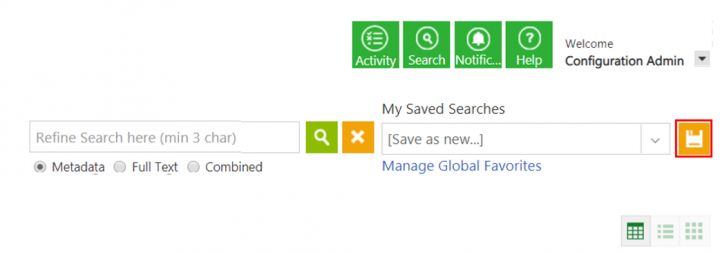
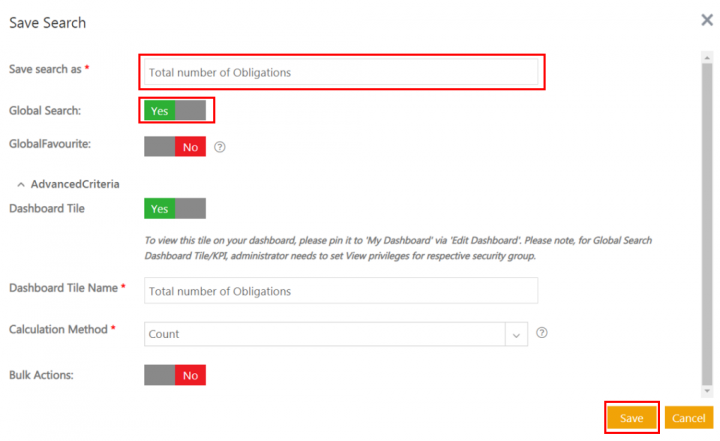
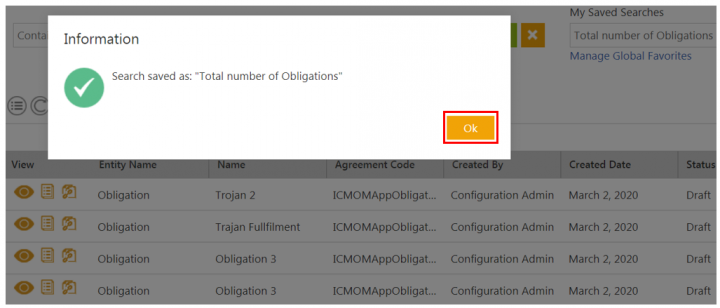


Additional platform support for Associations have been added. These enhancements support full platform functionality for Association metadata that was previously available only for Agreement metadata. The additional enhancements fall into three main areas:
One of the primary functional drivers for these new capabilities is to enable full functionality for Multi-party Agreements.
Building on the functionality around one-to-many relationships in Associations, ICM provides the ability to reference Association counts in Rule criteria. Since Rules can now be written for individual Attributes of an Association, it enables Admins to write Rules based on the count of Associations that have been added of a specific type. All attributes for Associations are available for the given Rule conditions and every Association has a specific sequence number so that the metadata of that sequence is tagged in the Template. You can search selected values of an Agreement or an Associated Document. For a multi-division Agreement, ICM supports writing Rules based on individual instances of the multi-value attributes.
When Rules are written based on the Attributes of the Association, the rules support tagging of the Metadata that belongs to the association. The associations may either be parent-child or peer. After the content control tag is entered, the value of the associated instances’ metadata is placed in the content control as shown in the example below.
You can create a saved search to get the Association attribute and assemble it in the Agreement. You can sort any of the available columns. The name of the saved search is used to tag that association’s Metadata into the Template. This feature works only on Publish Agreement and Edit Agreement.
These changes to the attribute are done by editing the content control in Word manually. The example below shows the content control tag.
Note: This is not available in ICM Word Add-in.
Example:
ICMAssociation I AssociationSavedSearchName{0}. ICMClientContactPerson
where,
Click here to enter text.
File -> Options -> Customize Ribbon -> Enable Developer
where,
The functionality of alerting users on redlining of changes in Association tagged as a table is visible through the Versions tab of the Agreement document. Let’s see an example where the user edits a table tagged as Association and then uploads a revised Agreement to ICM and how ICM alerts the user regarding the changes made in the table tagged as an Association.
To edit an existing Agreement where a table is tagged as an Association:
1. Click the Agreement Management tile on the Home page. The Agreement Management page opens.
2. Click the View Record icon next to the Agreement in which you want to edit the Associated Document table. The Agreement Details page opens. For example, Main Sales Order 2.
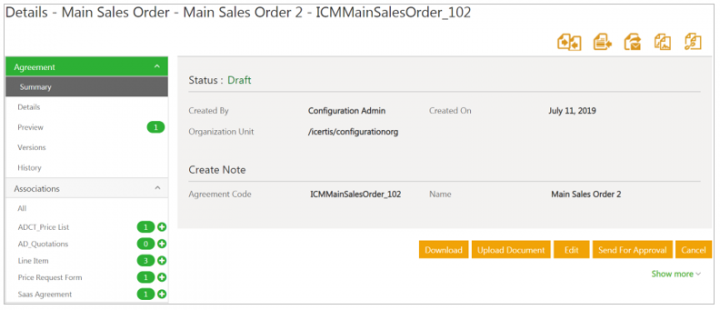
5. Click Save.
6. Click Upload Document in ICM. The Upload Document window opens.
7. Click Select File to select the revised Template.
8. Click Upload File to upload the revised file. The Please Confirm window opens with a message Changes in Association Table(s).
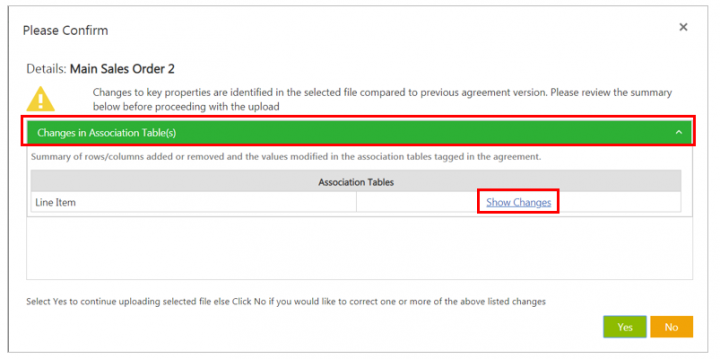

When modifications are made using the ICM Scribe Word Add-in, a user can view the changes in the Associated table of the published Agreement.
ICM alerts the user and presents a summary of any text that is added or modified in association(s) tagged as file(s).
The following actions take place as soon as a new agreement version is uploaded:
To view changes in Associations tagged as a file:
1. Click Download in ICM. The agreement document is downloaded.
2. Click Enable Editing to edit the agreement document.
3. Log on to Icertis Experience for Word.
4. Edit the agreement document. For example, let us edit Annexure2, which is tagged as an association as a file.
5. Click Publish. The Publish Agreement window opens.
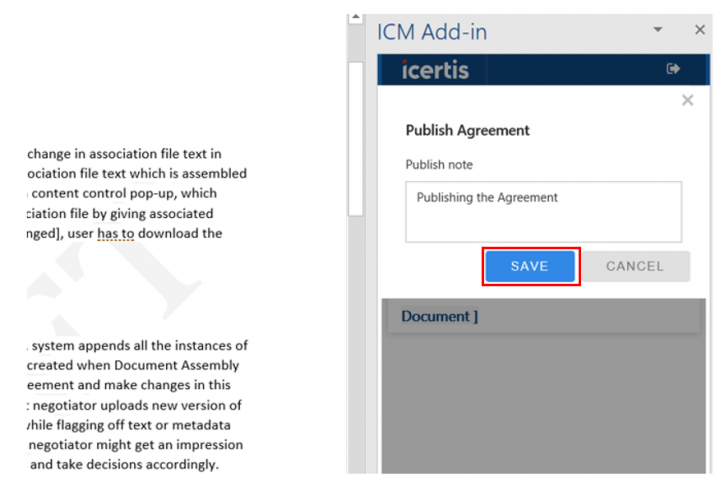
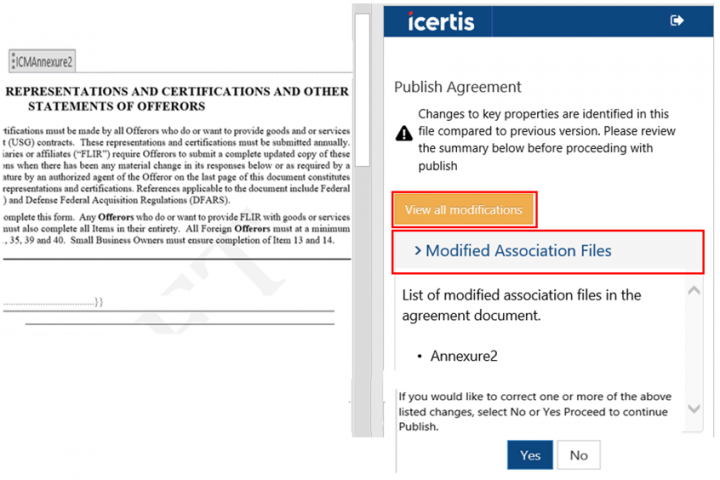
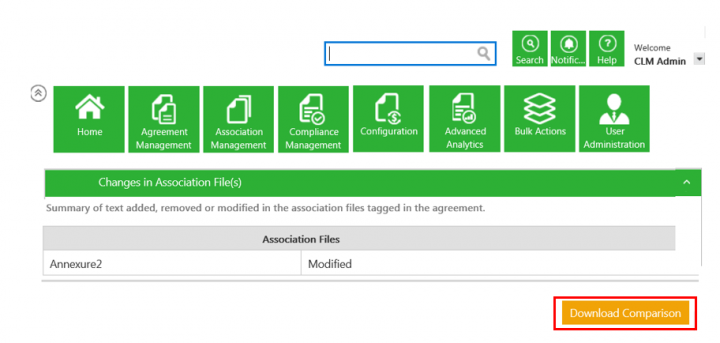
1. Click Download in ICM. The agreement document is downloaded.
2. Click Enable Editing to edit the agreement document.
3. Log on to Icertis Experience for Word.
4. Edit the agreement document. For example, let us edit Annexure2, which is tagged as an association as a file.
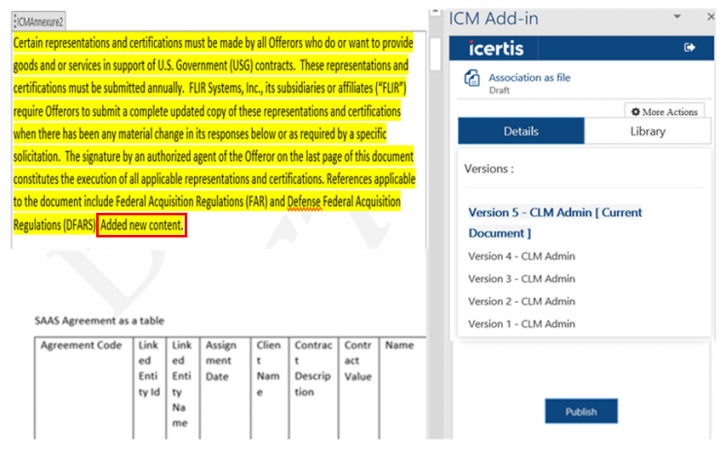
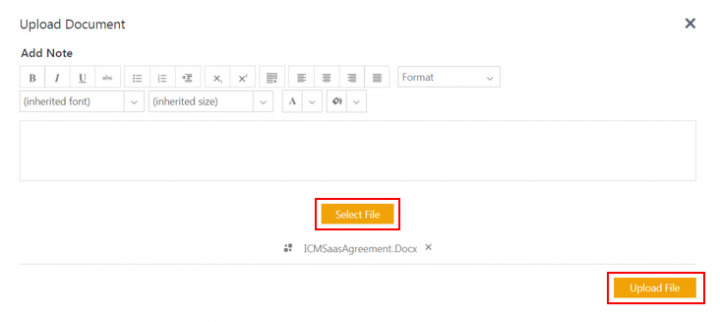
When the Associated Document is created, the approval rule triggers, and the document is sent to the approvers that are set by the approver rule. If you are an approver, you can approve or reject the associated document.
To approve an Associated Document:
1. Click the Tasks tile on the Home page. The User Tasks page opens.
2. Click the Association name link that you want to approve. The Associated Document Details page opens.
3. To Approve the document, click Approve. To reject the document, click Reject. A notification is sent to the Primary and Secondary Owner of the document every time an approver approves or rejects a document.
4. If you click:
You can enable, disable, reassign, or remove approvers using the respective buttons from the Team tab of the Association after it is created. This can be done for the Associations that are in Approved or Waiting for Approval states.
If you are an approver of the Associations for Agreements and Amendments, you can request more information for an Association that is in Waiting for Approval state using the Need More Info button. You can also remove yourself as an Approver using the Remove Mebutton for an Association that is Waiting for Approval.
Related Topics: Agreement Management | Agreements Page | Contract Type | Saved Searches | Adding Supporting Documents to an Agreement | Obligation Management
You do not have permission to edit this page, for the following reason:
You are not allowed to execute the action you have requested.
You can view and copy the source of this page:
Return to Association Management.